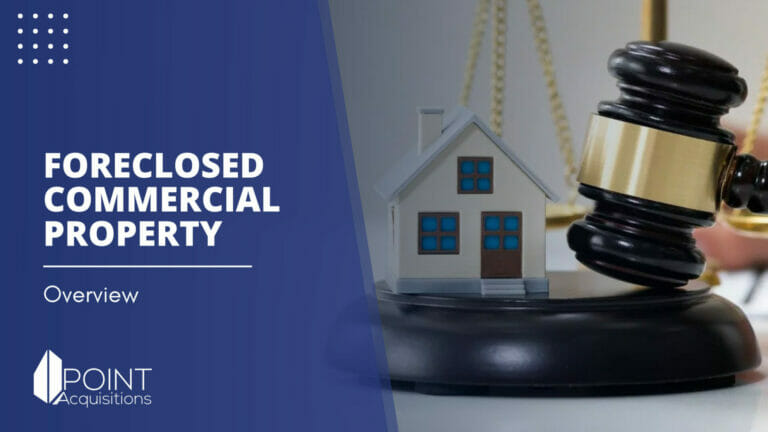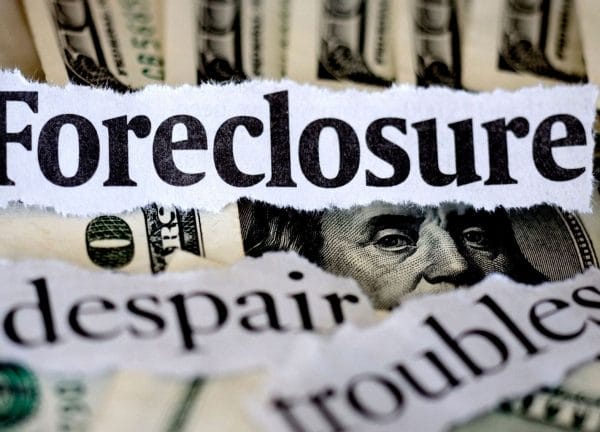
Commercial Real Estate Foreclosure: What to Do?
Foreclosure may be a frightening term, especially when it comes to your house. But what if it happens to your commercial property? Commercial real estate foreclosure can have disastrous consequences for business owners.
When a borrower fails to make mortgage payments or breaks another commercial loan condition, such as failing to maintain a debt ratio demanded by the lender, a business may face foreclosure. Foreclosure is the legal process by which a lender takes back property pledged as collateral for a loan.
Each state has its commercial foreclosure laws. The essential information about business real estate foreclosures is included below.
Table of Contents
Current Situation with Commercial Real Estate Financing
At Point Acquisitions, we constantly evaluate the situation on the market so we could always provide solid advice to our clients including about commercial property foreclosure.
There are hundreds of billions of dollars of bridge debt coming due – most of which was underwritten to be refinanced at 4% interest rates. It’s possible that many of these “syndicator” deals will either sell for less than the value of their purchase or be foreclosed upon, depending on how predatory their lender chooses to be.
Many investors failed to secure long-term fixed debt when it was possible. Unfortunately, most wanted the higher upside of a bridge and ignored the increased risk.
The market will show what happens next, but we anticipate an uptick in commercial building foreclosures in the coming months.

When Does a Commercial Foreclosure Start?
A commercial foreclosure starts when a business defaults on its mortgage payments. However, it’s not just about missed payments. Other triggers can include violating terms of the loan agreement, such as not maintaining a stipulated debt ratio or failing to meet other specific conditions set by the lender. Business owners must be aware of their loan terms and communicate openly with their lenders. Early intervention and understanding the initial signs can be the key to navigating and potentially averting a full-blown foreclosure process. Staying informed and proactive can make all the difference in commercial real estate.
Commercial Real Estate Foreclosure Types
Nonjudicial and judicial commercial real estate foreclosures are two types of commercial property foreclosures. The procedure for foreclosure is determined by law and state, so it’s important to know which type of foreclosure your state uses.
Nonjudicial or judicial commercial foreclosures are used to start the procedure when a borrower defaults on a mortgage. When a borrower fails to fulfill any of the terms of their mortgage, the lender can start a foreclosure proceeding, notifying the borrower of the reason for default and instructing them on how to cure it before anything is accelerated.
The mortgage conditions determine the time allowed to remedy a default. It is usually thirty days, although this can vary depending on the loan terms. If 30 days have passed since the notice and the borrower has not cured the default, then the lender may start a judicial foreclosure.
Judicial Foreclosure Process
A lender can file a lawsuit against the borrower to pursue judicial foreclosure, a notice to “cure or quit.” The debtor and creditor may negotiate to submit a response to the court between 20 and 30 days. After that, the lender determines a repayment deadline.
The lender’s attorney will request a title report required by law to discover who must be named as defendants in the lawsuit. It’s conceivable that the plaintiffs would be debt collectors (like junior mortgage holders) and the IRS if a tax lien has been placed on the property. The attorney will receive copies of all commercial mortgage documents below the first lien, including the mortgage, security agreement, assignment of leases (if any), assignment of rents (if any), UCC filings, and any guarantees.
If the business fails to pay a commercial loan, it is quite common for the owner to provide a personal guarantee promising payment on their behalf. The company will also be sued, with the business owner and the firm itself as guarantors. Each defendant must receive a copy of the complaint, either personally or by publication if a certain defendant cannot be located.
A foreclosure auction might be planned to sell the property and pay off the outstanding mortgage obligation.
If the borrower decides to dispute the foreclosure, they and the lender go to the trial court — often known as “acceleration.” At this point, the auction date is determined and is generally 90 days from the acceleration filing. If the lender wins, it is granted a foreclosure judgment and an order of sale.
The lender’s lawyer will file a motion for judgment in an uncontested foreclosure.
Due to the court’s requirements, judicial foreclosures generally take significantly longer to complete than nonjudicial foreclosures.
Nonjudicial Foreclosure Process
In certain jurisdictions, a lender may employ the nonjudicial foreclosure process to repossess the property from the borrower. The process is similar to home foreclosure. It is much quicker than the judicial foreclosure process as it does not require the lender to go to court.
Nonjudicial foreclosures are a legal alternative to the court system, allowing lenders to foreclose on a property considerably faster than a judicial foreclosure. Although the exact procedures taken during a nonjudicial foreclosure vary by location, they usually include:
- Sending the borrower a formal notice of default,
- Putting up a written notice of sale on the property, and
- Foreclosing (or selling) the property at a public auction to pay off the balance.
Nonjudicial foreclosures are permitted in 29 states, including California, Columbia, Texas, and West Virginia.
Court-Appointed Receivers in the Commercial Foreclosure Process
Although many states now allow quicker nonjudicial foreclosures, foreclosure may take several months. When the acceleration papers are filed, a receiver will typically be appointed. The borrower’s ownership responsibilities are transferred to the receiver.
The lender can request the court to appoint a receiver to manage the property during both the judicial and nonjudicial commercial foreclosure processes. A court-appointed receiver is a person who has been named by a court to administer the affairs of another party under bankruptcy laws. The responsibilities of a court-appointed receiver include:
- Maintaining the property so that it does not deteriorate,
- Managing the property to protect and ensure the property, and
- Collecting rents from renters and applying the money toward the borrower’s outstanding mortgage debt.

What Are The Consequences of a Commercial Real Estate Foreclosure Sale?
During a commercial foreclosure sale, the foreclosed commercial property is sold to the highest bidder, and the funds are used to pay off the borrower’s loan with the lender. The lender will compete against other lenders to buy the property during this business foreclosure sale.
The lender’s offer – also known as a credit bid – includes the borrower’s whole debt to the lender: principal mortgage balance, accrued unpaid interest, late fees, legal expenses, and other expenses.
A court-appointed receiver can help lenders avoid the commercial foreclosure sales procedure. The receiver must persuade the court, lender, borrower, and junior lenders to agree to the property being sold outside of a foreclosure sale. Before the foreclosure sale, receivers are sometimes permitted to sell the property. A “deed in lieu” or “deed instead of foreclosure” sale is one in which the property changes hands without going through the legal process of being foreclosed upon.
How to Avoid a Commercial Real Estate Foreclosure?
In the business world, things do not always go as planned. It’s advisable to contact the lender as soon as possible if a commercial borrower is on the verge of defaulting on a mortgage.
Lenders are generally hesitant to file a foreclosure action on a business facility. They’re not in the business of buying and selling commercial real estate, so they’d rather not deal with finding a buyer for a foreclosed property, also known as an REO or real estate-owned property.
Avoiding a commercial foreclosure can be advantageous for both the borrower and the lender. The examples below show some of the ways our attorneys may assist you in avoiding foreclosure.
Option #1: Make a forbearance agreement with the lender.
A mortgage forbearance agent collaborates between the borrower and lender to develop an alternative to foreclosure. The forbearance plan aids the borrower in lowering their outstanding loan amount over a specified period, allowing them to catch up on payments or develop new sources of funding to pay back the debt. Typically, the lender will agree not to start the foreclosure process during the forbearance period. Forbearance agreements might be a wonderful alternative for some borrowers about to lose their properties in foreclosure.
Option #2: Modify the existing mortgage with the lender.
The borrower may modify the terms and conditions of the first mortgage loan agreement, lowering the interest rate to decrease monthly payments or extending the due date term of the loan. If the current borrower pays off the debt during the foreclosure process, it is as if no foreclosure has taken place; the owner regains good standing with the lender.
Option #3: Filing for bankruptcy
Filing for chapter 11 bankruptcy (Chapters of the U.S. Bankruptcy Code) might assist business property owners in stopping the foreclosure process and negotiating debt with lenders. It is not good to file for bankruptcy only to prevent foreclosure. However, if renegotiating debts and re-assigning assets can help you keep your commercial property, bankruptcy may immediately halt foreclosures.
The company usually may continue to operate during a Chapter 11 bankruptcy, and the firm owner who is filing for bankruptcy can manage it. Individuals, companies, LLCs, and other business entities can use Chapter 11.
The main aim of Chapter 11 bankruptcy is to help debtors restructure their operations and finances so that they may pay back creditors. During Chapter 11 bankruptcy, lenders are typically prohibited from legal action to recover their debts.
Option #4: Transfer of ownership
Instead of a foreclosure, a deed in lieu is a legal document that transfers the ownership of the property from the borrower holding a title to the lender. If you bought a property with an adjustable-rate mortgage (ARM) when the deed passes title to the lender, the debt on the property loan is forgiven. Although this might be perfect for some organizations, it does imply that the property is no longer yours. A deed in place of foreclosure may be a good option for firms going out of business since it saves money and time while eliminating the uncertainty that comes with foreclosures.
Option #5: Consider a short sale
When the borrower sells a property for less than the outstanding amount, it’s called a short sale. A lender may agree to this sort of sale to avoid the cost and inconvenience of going through the foreclosure procedure. A short sale is another alternative for the borrower to avoid the costs and aggravation of foreclosure.
In Conclusion
Commercial real estate foreclosure is a long and difficult process, but there are ways to prevent it. If you act quickly and consult with the right people, you can keep your commercial property and avoid the many negative consequences of foreclosure.
At Point Acquisitions, we offer sound advice on anything to do with commercial real estate. Check out our recent blog post about how high-interest rates affect commercial real estate.
If you or your organization face commercial real estate foreclosure, don’t hesitate to contact us. Our team of experts is here to help you through this difficult time and find the best solution for your unique situation.
About The Author

Jesse Shemesh
Disclaimer
Please note that Point Acquisitions is not a tax expert or tax advisor. The information on our blogs and pages is for general informational purposes only and should not be relied upon as legal, tax, or accounting advice. Any information provided does not constitute professional advice or create an attorney-client or any other professional relationship. We recommend that you consult with your tax advisor or seek professional advice before making any decisions based on the information provided on our blogs and pages. Point Acquisitions is not responsible for any actions taken based on the information provided on our blogs and pages.
1031 Exchange Capital Gains Tax Deferral
According to a 2021 report by the National Real Estate Exchange Services (RES), over 240,000 1031 exchange transactions were completed in the United States, totaling $100 billion. This impressive figure underscores the role of 1031 exchanges in the real estate…
Read More1031 Exchange Benefits
As of Q4 2023, the national vacancy rate for all commercial property types in the United States sat at 9.2%, according to CBRE’s latest insights and research. This represents a slight decrease compared to the previous quarter and suggests a…
Read More1031 Exchange Legal Considerations: A Must-Read Guide
You’re in the right place if you’re considering a 1031 exchange for your commercial real estate investments. Whether you’re a seasoned investor or just dipping your toes into the market, understanding the legal landscape of 1031 exchanges is key to…
Read More

